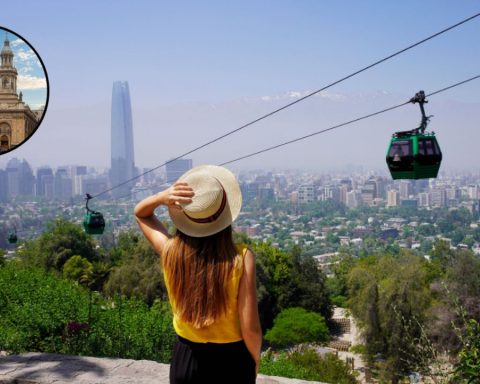Uncertainty abounds in the National Congress. The surprise nomination of Ángel Valencia as the third government candidate to lead the National Prosecutor’s Office exposed the volatility of the parliamentarians of the Upper House. If at one point the vote is A, any action considered inconvenient changes the vote to B. This is precisely the situation that has the Government today with great concern. The votes of the parliamentarians who were supposedly in favor of Valencia yesterday began to drop today, without even listening to the lawyer’s presentation before the Senate, scheduled for next Monday, January 9.
From the shore of Approve Dignity, PC Senator Daniel Núñez, in conversation with The Counter in La Claveaccused that the current candidate of La Moneda is a name that “installed the hard right” and that his nomination does not seem to him a good sign for the country and, although he hinted at the resentment that abounds in this regard in Approve Dignity, he avoided advancing the content of your vote.
From Democratic Socialism –that on paper they are with Valencia– they also began to experience fissures. One of these is represented by Senator Loreto Carvajal (PPD), who announced that she will vote against Valencia, because –in his opinion– does not comply with the ethics or professional competence required for the position, and that “the Government has been defeated against a rooster initiated by senators.”
“A prosecutor must be the moral reserve to prosecute organized crime. It must be understood that the defense based on protecting the wealth of some and sentenced cases of abuse of minors and women can only be contrary to what a National Prosecutor is ( …). The name of Mr. Valencia, discarded on two previous occasions, today put on the table, taking into account his professional qualities, I don’t know what type, of course he attracts and there is attention regarding how to reach a name discarded twice, ”said the parliamentarian.
Senator Iván Flores (DC), meanwhile, also questioned Valencia’s candidacy, understanding that –according to your optics– the prosecutor Juan Agustín Meléndez was the name that aroused the greatest support –about 40 votes, according to estimates–Therefore, the sudden appointment of Valencia caused surprise and discomfort in the Senate, especially in a sector of the ruling party. “This turn that the Government is making looked bad, it smells bad and it seems bad, because clearly, when all the signs were in that line, when there were two ministers (Ríos and Uriarte) working on it, the President left them without a floor. It is It is true that it is attribution of the President, but, then, why send to talk, why send to ask, if in the end he is going to do what he wants? Unless, in this rarefied environment of politics, the Government has decided to negotiate with the hardest right,” warned Flores.
Regarding the possible negotiation with a sector of the right, in exchange for avoiding constitutional accusations against Ríos and Jackson, the senator for the Los Ríos Region added that “it would be very painful and very complicated, where, to save the skin of his ministers , eventually a person is named that the government did not want to name”.
Although as a deputy he does not have candles in this funeral, René Alinco reported a transversal climate in Congress. Not only senators agree with the hypothesis that the appointment of Valencia “obeys a transaction and a political agreement between the right and people from La Moneda,” he said. In addition, he said that “it was a whole plot that was brewing,” and accused the government of President Boric of being, for some time now, “negotiating behind the scenes with the right, the parliamentary and economic right.”
The doubts in the opposition
Although on the right would be the large number of votes that Valencia needs to reach a quorum of 2/3, resentment is also beginning to rise in the opposition, particularly due to the process of his nomination, and this possible negotiation, led by UDI senators and RN. And although the trade unions would square up behind the government candidate, in the RN bench there are voices of annoyance, because this transaction with La Moneda would not have been communicated, so –for now– it is possible that some votes in that sector are inclined to reject President Boric’s letter.
One of the critical voices around this process was that of Senator Alejandro Kusanovic (Ind. RN), who assured that “up to now I am going to vote against the candidate.” In the parliamentarian’s opinion, the subject has been too handled, causing the current process to have been “even more contaminated than the previous process”, in reference to the controversial election of Jorge Abbott in 2015. In this sense, Kusanovic denounced that “there was negotiations between the parties, which is something I don’t like. This handling of information, negotiations, does not seem right to me. It is precisely what people are tired of, bad political practices, and we continue to make the same mistakes,” held.
For his part, and without advancing his vote in this Monday’s session, the senator of said store, Manuel José Ossandón, acknowledged that he would have no problem voting in favor of Valencia, because –as he says– trusts the five candidates proposed by the Supreme Court. However, the parliamentarian acknowledged that the internal talks will continue their course and that there will be a new meeting of the RN committee in the Senate, prior to the appearance of the candidate for National Prosecutor, scheduled for next Monday, January 9.
“Here there was a last-minute negotiation, between the Government and the UDI, where a RN parliamentarian could probably have also participated. So far, it is unknown what they negotiated, but until this Wednesday there was always talk of Meléndez and Palma , never from Valencia. It was a surprise nomination, where the ministers (Ríos and Uriarte) were also harmed,” Ossandón said.
In this context, with an opposition where doubts and resentments are also beginning to arise in the face of the third letter from the Executive to lead the Public Ministry, in the coming days La Moneda must try to save the Government from a catastrophic situation, in the midst of a rarefied process, and that had a new controversial edge in the nomination of Ángel Valencia. With the delegitimized ministers Ríos and Uriarte, whose work regarding the position of Juan Agustín Meléndez in the Senate was not finally considered by President Boric, the Executive is left with no margin for error, assuming that a new defeat could aggravate their complex relationship both with the Judiciary as well as with the National Congress.















